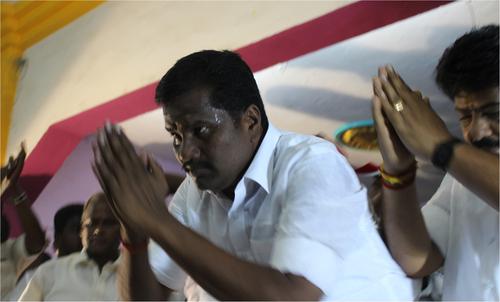当前位置:
X-MOL 学术
›
American Ethnologist
›
论文详情
Our official English website, www.x-mol.net, welcomes your
feedback! (Note: you will need to create a separate account there.)
Wave theory
American Ethnologist ( IF 1.9 ) Pub Date : 2021-02-19 , DOI: 10.1111/amet.12986 FRANCIS CODY 1
American Ethnologist ( IF 1.9 ) Pub Date : 2021-02-19 , DOI: 10.1111/amet.12986 FRANCIS CODY 1
Affiliation

|
In India, as elsewhere, voters and electoral observers refer to powerful, emerging political trends as “waves,” such as the “Modi wave” that brought Prime Minister Narendra Modi to power. In rural South India, during the run‐up to the 2019 national elections, how did people read signs of political waves, and how did voters align themselves with these signs as they circulated across media forms? A “wave theory” analysis finds that rural voters in the state of Tamil Nadu assess electoral chances across various factors—including candidates’ cash flow, crowd behavior, caste calculations, and professional analyses of polling data. People take electoral positions within ambient and layered ecologies of information, in which everyday speculation about political fortunes is situated alongside formalized methods of analysis, calculation, and prediction. And because electoral waves are experienced locally but often carry energy from afar, they constitute both a force and a fluid medium of convergence. [elections, democracy, prediction, crowds, money, caste, media, Tamil Nadu, India]
中文翻译:

波动理论
在印度,与其他地方一样,选民和选举观察员将强大的新兴政治趋势称为“波浪”,例如使纳伦德拉·莫迪总理上台的“莫迪波浪”。在印度南部的农村,在运行到2019年的全国大选中,人们如何阅读政治浪的迹象,并没有选民如何赞同这些迹象,因为他们在媒体形式通知了吗?“波动理论”分析发现,泰米尔纳德邦的农村选民通过各种因素评估选举机会,包括候选人的现金流量,人群行为,种姓计算以及民意测验数据的专业分析。人们在环境和分层的信息生态系统中担任选举职务,日常关于政治命运的推测与正式的分析,计算和预测方法一起存在。而且由于选举波是局部存在的,但通常会从远处携带能量,因此它们既是力量又是融合的流动介质。[选举,民主,预测,人群,金钱,种姓,媒体,泰米尔纳德邦,印度]
更新日期:2021-02-19
中文翻译:

波动理论
在印度,与其他地方一样,选民和选举观察员将强大的新兴政治趋势称为“波浪”,例如使纳伦德拉·莫迪总理上台的“莫迪波浪”。在印度南部的农村,在运行到2019年的全国大选中,人们如何阅读政治浪的迹象,并没有选民如何赞同这些迹象,因为他们在媒体形式通知了吗?“波动理论”分析发现,泰米尔纳德邦的农村选民通过各种因素评估选举机会,包括候选人的现金流量,人群行为,种姓计算以及民意测验数据的专业分析。人们在环境和分层的信息生态系统中担任选举职务,日常关于政治命运的推测与正式的分析,计算和预测方法一起存在。而且由于选举波是局部存在的,但通常会从远处携带能量,因此它们既是力量又是融合的流动介质。[选举,民主,预测,人群,金钱,种姓,媒体,泰米尔纳德邦,印度]











































 京公网安备 11010802027423号
京公网安备 11010802027423号